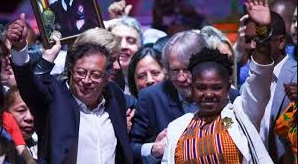
President-elect builds alliances to strengthen his position in Congress and push through key reforms.
Gustavo Petro, Colombia’s president-elect, has secured the backing of the Liberal Party in his quest to form a broad governing coalition in Congress. This significant move comes as Petro aims to implement his ambitious agenda, which includes reforms to the country’s fiscal, agrarian, and pension systems. The support of the Liberal Party, traditionally aligned with Colombia’s political establishment, marks a pragmatic step by Petro as he seeks to unite various political forces.
Petro, who made his name as a former mayor of Bogotá and as a member of the M-19 guerrilla group that demobilised in the 1980s, won the presidency in a historic second-round victory over the political establishment. His win on Sunday dealt a significant blow to Colombia’s traditional political elite, who have long been accused of perpetuating corruption, violence, and inequality, despite overseeing the country’s economic growth.
The Liberal Party’s decision to join Petro’s coalition, led by former president César Gaviria, reflects the president-elect’s ability to form political alliances with key figures. “We won’t be a party of opposition,” said Gaviria, signalling a commitment to work with Petro’s Historic Pact group, though details about the role the Liberal Party will play in the government are still under negotiation. The Liberal Party holds 14 seats in the Senate and 32 in the House of Representatives, making it one of the largest factions in Colombia’s bicameral legislature.
With 20 seats in the Senate and 27 in the House of Representatives, Petro’s Historic Pact is still short of a parliamentary majority, and the addition of Liberal Party support would bring him closer to securing one. Political analyst Sandra Borda from the University of Los Andes in Bogotá noted that the content of the policies Petro will push through Congress remains uncertain. She pointed out that foreign governments and investors will be closely watching Petro’s choice for finance minister, which could provide clues about whether his administration will favour increased state intervention in the economy.
Despite his victory, Petro is likely to face significant opposition from the Democratic Center, the party founded by former president Álvaro Uribe. The party, which remains a major force in Colombian politics, is expected to challenge many of Petro’s reforms. Current president Iván Duque, a member of the Democratic Center, will formally hand over power to Petro on August 7.
Meanwhile, real estate tycoon Rodolfo Hernández, who garnered 47% of the vote in the second round, has yet to confirm whether he will accept a Senate seat. If he does, it would strengthen the opposition in Congress. However, Petro’s ability to forge alliances in the coming months will be crucial to his ability to pass key legislation and enact the changes promised during his campaign.












